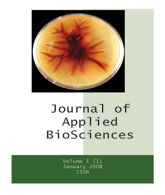Journal of Applied Biosciences (J. Appl. Biosci.) [ISSN 1997 - 5902]
Volume 55: 3944 - 3952. Published July 27, 2012.
Growth, yield and quality response of snap bean (Phaseolus vulgaris L.) plants to different inorganic fertilizers applications in central Kenya.
*1Kamanu, J.K., Chemining’wa, G.N., Nderitu, J.H. and Ambuko, J.
University of Nairobi, Department of Plant Science and Crop Protection, P. O. Box 29053, 00625, Nairobi
1Corresponding author: kamanuj@yahoo.co.uk
RESUME
Objective: An on-farm trial was established under furrow irrigation in two seasons. The first season trial was planted on 5th March 2010 and the second season trial on 6th November 2010 at Kimbimbi in Kirinyaga South district, Kenya to evaluate the effect of inorganic fertilizer application regimes on growth, yield and quality of snap beans.
Methodology and results: The fertilizer treatments comprised: (i) application of di-ammonium phosphate (DAP) at planting and topdressing with calcium ammonium nitrate (CAN) at 21 days after planting (dap); (ii) application of DAP at planting and topdressing with NPK-17:17:17 at 21 dap; (iii) application of DAP at planting, topdressing with CAN at 21 dap and topdressing with NPK-17:17:17 at 35 dap; (iv) application of CAN at planting, topdressing with CAN at 21 dap and then topdressing with CAN at 35 dap; (v) control (no fertilizer added). The varieties tested were Amy and Serengeti. The trial was laid out in a randomized complete block design with a factorial arrangement and replicated three times. The data collected included crop emergence, number of nodules per plant, nodule dry weight, shoot dry weight, root dry weight, pod yield and yield components. The results showed that inorganic fertilizer application depressed nodulation relative to the control. Generally, application of DAP-CAN and DAP-NPK significantly increased shoot dry weight while CAN alone had no effect. All treatments except DAP-NPK had significantly higher fine pod yield than the control in Amy while all fertilizer treatments improved fine pod yield in Serengeti. DAP-CAN fertilizer application had the most positive effect in Serengeti while DAP-CAN-NPK had the most positive effect in Amy. Snap bean growth and pod yield responses is dependent on genotype.
Conclusion and application: DAP-CAN fertilizer application on Serengeti plots had 40.7% and 344.1% higher net profit than the average profit of all the fertilizer treatments on Serengeti and Amy, respectively. Use of DAP-CAN fertilizer with variety Serengeti is the most profitable option for smallholder farmers in Mwea.
Key words: Extra fine pods, fine pods, Serengeti, Amy, inorganic fertilizer.
FULL PAPER [PDF AVAILABLE HERE]
